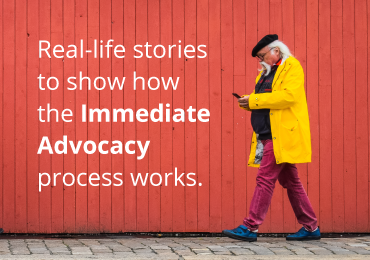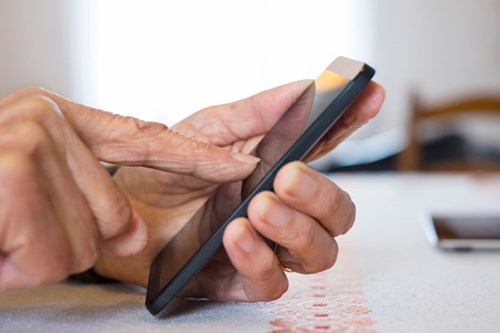
|
Immediate Advocacy We are the Medicare Quality Improvement Organization, working to improve the quality of care for Medicare beneficiaries. Our site offers beneficiary and family-centered care information for providers, patients, and families. Welcome! |
related links
- How to File a Quality of Care Complaint
- How to File an Appeal
- Appoint a Representative
- Resources
- En Español
speak with kepro about immediate advocacy
Click on the button below to find the phone number for your state.
immediate advocacy: real life examples
Through the Immediate Advocacy process, Kepro serves as an advocate for those people who have Medicare to access needed health care.
Read a real-life example:
how immediate advocacy helped a medicare patient when a hospital discharge appeal wasn't successful.



What happens if you are being discharged from the hospital, but you don’t feel like you’re ready to go home yet? And then you call Kepro to file a discharge appeal, but it gets denied and the discharge continues? That’s what happened to Andrea.
Andrea was in the hospital (as an inpatient) with a bad case of pneumonia. She was feeling better. When her friend Sherry visited, Andrea said that she was being discharged. She did look forward to being back home, but she still felt weak and wanted to stay in the hospital for a few more days. Sherry felt bad and wished she was able to do something.
Sherry noticed paperwork on the bedside table. Andrea said hospital staff gave it to her. It was a form called "An Important Message from Medicare.” The form included the phone number for Kepro and tells you what you need to do to appeal the discharge. Andrea didn’t feel up to calling and asked her friend, Sherry, to call.
Sherry called Kepro and asked about doing an appeal to stop the discharge, so Andrea could spend a few more days in the hospital. At the end of the appeals process, Kepro called with the results – the physician reviewers agreed with the hospital about the discharge. The patient, Andrea, would need to leave the hospital.
The Kepro representative could tell that Andrea was upset and spent time talking with her. The Kepro representative learned that Andrea wasn’t ready to go home because she still felt weak, and she lived alone and had no one to help her.
In addition to helping to file discharge appeals, Kepro has another free service called Immediate Advocacy that helped to work through this issue.
The Kepro representative transferred the call to a nurse who talked to Andrea and her friend about Immediate Advocacy services. The Kepro nurse wanted to be sure that the patient was fully communicating with hospital staff.
Sometimes staff come into the room to talk with the patient, and the patient is either asleep or not in the room. The Kepro nurse wanted to be sure that the patient was talking with the appropriate hospital staff to get any questions answered.
The nurse asked Andrea if she had talked with the hospital’s discharge planner to be sure she had a discharge plan that she understood and felt good about. The nurse from Kepro also asked if the patient had talked with the hospital’s social worker about any services she thought she may need.
The patient said that she had not spoken with them and was concerned that she wouldn’t have the chance before she had to leave the hospital.
After the patient agreed to move ahead with the Immediate Advocacy process, the Kepro nurse called the hospital and spoke with hospital staff to make them aware of what was happening and asked that they talk with Andrea before she was discharged. The patient was grateful that the nurse from Kepro was able to help.
As a result of using Immediate Advocacy services, the patient, Andrea, was able to speak with the social worker and discharge planner. The social worker provided information to Andrea about local services that she may need such as transportation (if she was not able to drive) and meal service (since she lived alone and may not be able to get out right away). The discharge planner talked with Andrea about her plan of care (also called a discharge plan) and made sure that the patient understood it and was able to follow it.
Now, the patient had the necessary information and understanding about the next steps that will go far to ensure a successful discharge and continued recovery at home.
When she first started talking with Kepro about the discharge denial she was upset, but Kepro took the time to find out more about Andrea’s concerns and was able to get information to help her feel more comfortable about going home.
Of course, Andrea’s friend Sherry would help when she could (such as giving her a ride to doctor’s appointments), but it was good that Andrea had other help as well.
If you are on Medicare and are not happy with the care you received or if you need help working through an issue that needs to be taken care of right away, please call Kepro and ask about Immediate Advocacy services.
- Read more about Immediate Advocacy.
- Watch a video about Immediate Advocacy: Quickly resolve a medical concern using Immediate Advocacy services.
- Watch a video about appeals: Do you have Medicare? Learn how to file an appeal.
- For patients and their caregivers preparing to leave a hospital, nursing home, or other care setting: Discharge planning checklist (PDF)




